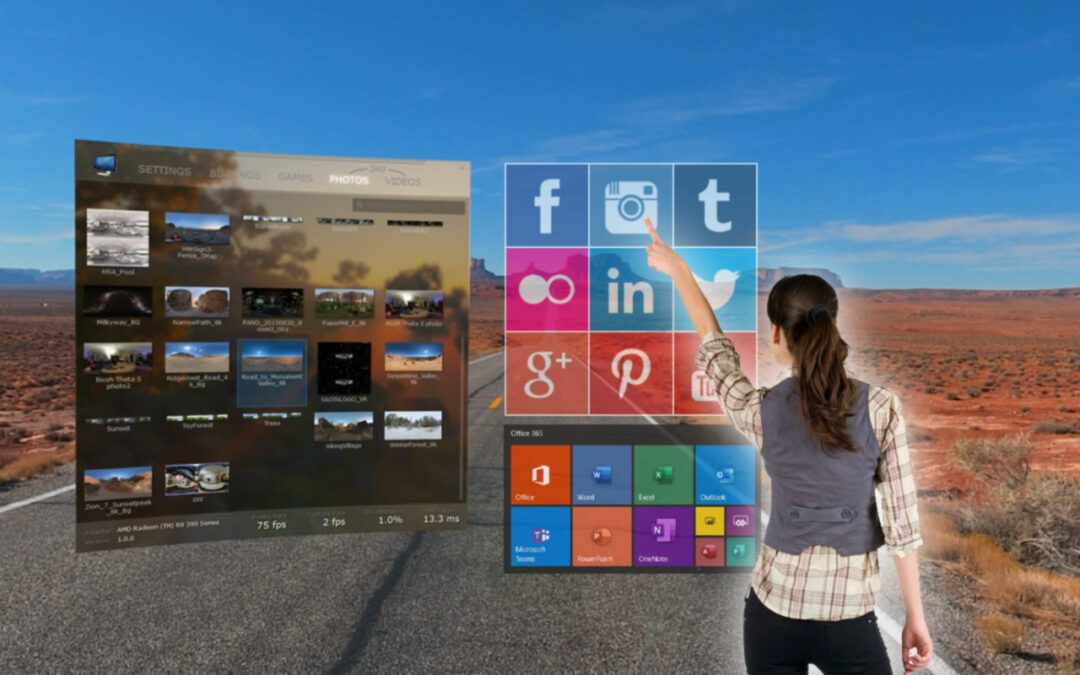This year, Mark Zuckerberg, the celebrity boss of the Facebook constellation (Facebook, Whatsapp, Instagram, Oculus, ...) spoke at the event (you never know 😁 ) about his vision of the future (5 to 10 years ahead) and in particular about the place that would be given to new uses linked to virtual reality or augmented reality.
If you've got 30 minutes to spare, you can watch a video of him being interviewed by Vivatech co-founder Maurice Lévy:
Setting the scene:
If you haven't seen Spielberg's "Ready Player One", I suggest you log on to your favorite Netflix account and have a movie night at home watching this futuristic film...
Indeed, what Facebook's boss is delivering is a vision of the world in which, for the greater good of all (🤔), virtual (online) universes, known in English as "Metaverses", have become daily living and sharing spaces, for everyone, whether to work, socialize or play...
His analysis is interesting at least in its starting point, but we'll see that whether we agree or not, it's not without consequences!
What and who are AR and VR (Augmented Reality and Virtual Reality) good for?
He takes the example of an initial partnership with Essilor & Ray Ban, which will see the release this year (probably 2021/2022) of the first pair of augmented glasses with a "normal" appearance. And from this example, he extrapolates (by mixing AR and VR interchangeably) what tomorrow's uses could be (the perspective he gives is 5 to 10 years):
Beyond the "obvious" aspects of social networks, online content sharing and games, he stresses the need for the pro world to investigate and imagine the new uses offered by VR as much as AR, by recontextualizing its experience using the example of remote meetings, which have become the rule since March 2020, COVID 19 obliges.
He explains, for example, thata wall of Teams thumbnails doesn't allow you to spatialize what a particular participant is saying, whereas the same meeting in VR in a virtual room with avatars makes it easier to remember exchanges because our brains can recontextualize them by representing them in space. So far, he's right... except for the fact that spending 3 hours in a meeting with a (current) headset on is probably not yet accessible to everyone, not least because of the constraints associated with using a VR headset (heat, feeling of confinement, inability to take notes, etc.).
From the explosion of creative potential to economic realities:
Tools still have a long way to go, but there's an emerging trend: tomorrow's world will largely mix real and virtual experiences... Which means that virtual environments will have to be structured, and our avatars will have to dress and adorn themselves, as in the real world, so that we can be coherent in the different universes in which we can/will be present.
And this situation has a direct impact: the fact that a parallel (virtual) consumer society will literally be born, enabling us to buy the goods and services we'll need to be present in these parallel dimensions (clothing, various tools, third places, etc.). And as you can imagine, in his head as a developer (IT and business), that's TILT! Mark calls it "The Creative Economy"! A very nice term for a concept that is first and foremost mercantile!
Who will create and develop all these virtual environments and consumer products? Who do you think? 🤔🤨
Back to the future: 2003 VS 2021
It's a lot like what, on a grand scale, the geekiest among you experienced in one of the first large-scale online virtual universes sketched out back in 2003! I'm talking about Second Life. The major difference being the immersive vision associated with it.
For Mark Zuckerberg, it has a name, the name of a project led by Facebook: the HORIZON platform project.
If you've never heard of it, this environment launched in 2020 is currently only available to developers in beta version. The idea, for the time being, is to offer an online VR platform to developers, enabling them to develop new concepts. For such an approach to work on the scale of Facebook (a planetary scale at the very least 🌎 ), this environment needs to capture a maximum number of people and retain them. And for that to happen, new value-added uses must abound!
Did you say monopoly? "Our vision in Facebook is surving everyone all over the world".
So, in short, Facebook creates the tools and environments and "makes them available" to those who will do business with them by selling their creations... Simple, effective, formidable.
A bit like today when you buy an OCULUS QUEST 2 headset (Oculus firm bought by Facebook in 2014) and to use it you have to link it to your... Facebook account... Or if you want to use it without that, you have to subscribe to a Pro license whose costs are let's say "not negligible" (we go from $399 to $799 for the hardware + 1 year license).
We're going to have to prepare some rebounds!
Indeed, when it's your augmented glasses (AR/VR) that mediate information (video, data, app, etc.), why would you continue to buy TV screens, video monitors or even smartphones? Consumer goods that have become useless IRL (In Real Life), replaced by their digital twins, available on demand, wherever you are, to watch a movie or call your buddies!

And don't forget that if 10,000 people at Facebook are working on AR and VR ecosystems (and they're not the only ones at FB, as you can see from what Usine Nouvelle told us in 2016 about Google on the subject), it's not just for show. The stakes are truly colossal, and on a time scale that is far from geological, since, once again, it's already here and definitely will be here in 5 to 10 years' time!
Let's stop for two seconds and breathe!
Why are we telling you all this, sometimes feeling a little like we're playing Cassandra while sawing off the branch we're happily sitting on?
Well, quite simply because the stakes are so high, it's important to be aware of them, so as not to have to put up with them!
When you know, you can look up and ask yourself how you can use these uses and technologies to your advantage. Because once you get past the "smiling psychosis" approach (have you noticed that he's still smiling, Mark?!), there are real opportunities to be seized, whether you're a sales manager in an SME, or managing the ongoing training of thousands of employees worldwide!
Just imagine:
- Your product showroom, your production sites or your finest creations, available to all your prospects and customers anywhere in the world, at any time, without you having to move from your office chair,
- Promote a place, without having to physically go there,
- Train employees or customers by putting them in situations that are difficult or even impossible to reproduce physically without deploying significant resources and costs.
- Go back in time and space or transport yourself to inaccessible places
These are just a few examples of what virtual and augmented technologies can already do on a routine basis, without revolutionizing our daily lives. And it has to be said that the current pandemic has only accelerated the need for these new uses.
Just remember that a number of studies have already demonstrated that immersive environments really do make sense, because they are truly the N+1 degree of perception, mobilizing unprecedented cerebral channels that optimize concentration, comprehension and retention... In this respect, they are an asset in many fields.
Whatever the case, let's be careful not to play the prophet... The future is always disruptive, and takes great pleasure in thwarting predictions. It will simply be what we decide to make of it! And when it comes to VR, as with everything else, we can decide to be intelligent and take advantage of all the good that these new technologies can bring us, leaving aside (for once) excesses, drifts and derailments!
Well, I say this....
Links :
https://fr.wikipedia.org/wiki/Second_Life
https://www.realite-virtuelle.com/facebook-horizon-beta-testeurs
https://business.oculus.com/products/?locale=fr_FR


